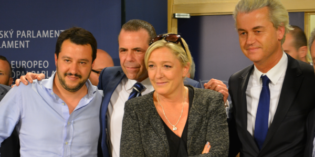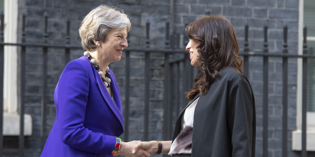political parties

Labour Party leadership: can Keir Starmer really maintain party unity?
Keir Starmer convincingly won the leadership of the Labour Party, gaining strong support in the parliamentary Labour Party, unions and the membership. However, as the controversy over a leaked report into internal party disciplinary procedures shows, unity is not a given. Max Kiefel compares the challenges Starmer faces to the circumstances of his two predecessors as party leader, and argues that it is not enough to create party unity, he must also lead the party to respond effectively to the Covid-19 crisis.

Most populist radical right parties across Europe are not eager to leave the EU
After the 2016 Brexit referendum, there was speculation that other Eurosceptic parties across the EU would try to capitalise on the result and advocate their own countries’ exit. However, Stijn van Kessel finds that any initial enthusiasm among populist radical right parties for EU-exit quickly faded, and most have been muted or equivocal in their Euroscepticism, concentrating instead on more immediate concerns of voters, who generally do not prioritise the EU.

The case of Fratelli d’Italia: how radical-right populists in Italy and beyond are building global networks
With several parties in Italy competing on the right and far right, Valerio Alfonso Bruno and James F. Downes look at the recent growth in support for Fratelli d’Italia. They argue that this party is building domestic support, along with a network of contacts of likeminded populist radical right actors globally, which demonstrates the increased mainstreaming of populist radical right ideas in liberal democracies.

How will the ‘Sinn Féin surge’ change Irish politics?
Professor James Hughes examines the historical context of the recent Irish election and what the result means for the future of politics on both sides of the border.

What can political parties do to involve more women in party politics?
In most political parties the majority of members are men, which has implications for achieving equal representation at all levels of politics. Aldo F. Ponce, Susan E. Scarrow and Susan Achury find that this gender gap varies considerably between parties, and that having more women MPs helps to increase women’s participation at the grassroots level.

How sexuality affects the choices of voters across Europe
Drawing on a new study, Stuart J. Turnbull-Dugarte demonstrates that sexuality has a significant impact on political behaviour across western Europe, with lesbian, gay and bisexual voters far more likely to back parties on the left.

The empty centre: why the Liberal Democrats need to demonstrate competence and unity to win votes
Liberal parties in western democracies which advocate broadly centrist economic policies, such as the Liberal Democrats, have performed badly in some recent elections, even though their policies are often in tune with a large proportion of the electorate. Using survey data Roi Zur finds they have little scope for winning votes by shifting in either direction on the left-right spectrum. Instead they need to demonstrate they are a credible and competent governing party, able to prevent Brexit, and are not just expressing their opposition to it.

Citizens (mistakenly) perceive female-led political parties as more moderate
Does women’s leadership affect citizens’ perceptions of political parties? Diana Z. O’Brien shows that female-led parties are perceived as more moderate than male-led organisations, even though election manifestos authored by these parties are actually slightly more extreme than those by male-led parties.

Is the resurgence of Europe’s far-right a cultural or an economic phenomenon?
There has been a spectacular rise in support for far-right parties in Europe over the last two decades, but what has driven this electoral success? Drawing on new research, Vasiliki Georgiadou, Lamprini Rori and Costas Roumanias demonstrate that different types of far-right party have benefitted from different factors: economic insecurity has helped increase support for ‘extremist right’ parties, while cultural factors have been associated with the growth of the ‘populist radical right’.



 Democratic Audit's core funding is provided by the Joseph Rowntree Charitable Trust. Additional funding is provided by the London School of Economics.
Democratic Audit's core funding is provided by the Joseph Rowntree Charitable Trust. Additional funding is provided by the London School of Economics.